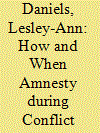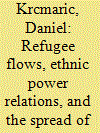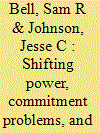|
|
|
Sort Order |
|
|
|
Items / Page
|
|
|
|
|
|
|
| Srl | Item |
| 1 |
ID:
140082


|
|
|
|
|
| Summary/Abstract |
Many studies have examined the formation of interstate rivalries, but few provide a theoretical mechanism capable of explaining why some neighboring states experience protracted conflict while others do not. To address this question, we theoretically link bargaining theories of conflict with issue-based explanations of conflict to offer a novel application of the commitment problem mechanism. We argue that when neighboring states disagree over border territory endowed with a potential source of power (i.e. strategic or economic value), it is difficult for either side to commit credibly in the future to comply with agreements made today. Consequently, neighboring states may be reluctant to make concessions that could enhance their adversary’s future bargaining power. This reluctance, in turn, increases the likelihood of bargaining failure, thereby also increasing the likelihood that the dispute festers and the relationship evolves into a rivalry. Using recently reported data on border settlement and three measures of rivalry, we find systematic evidence for our theoretical expectations. Unsettled borders increase the likelihood of rivalry onset. This relationship, however, seems driven by border territory containing strategic and economic endowments – the exact type of territory that theoretically drives commitment problems. We therefore conclude that not all territory matters for the onset of contiguous rivalries.
|
|
|
|
|
|
|
|
|
|
|
|
|
|
|
|
| 2 |
ID:
153561


|
|
|
|
|
| Summary/Abstract |
While emotions are widely regarded as integral to the “behavioral approach” to International Relations (IR), a host of fundamental problems have delayed the integration of affective influences into traditional models of IR. We aim to integrate affect by focusing on commitment problems, a body of work that contains strong theoretical predictions about how individual decision makers will and should act. Across two lab experiments, we use a novel experimental protocol that includes a psychophysiological measure of emotional arousal (skin conductance reactivity) to study how individuals react to changes in bargaining power. While we find support for one key pillar of IR theory—individuals do reject offers when they expect the opponent's power to increase—we also find that physiological arousal tampers with individuals’ ability to think strategically in the manner predicted by canonical models. Our follow-up experiment mimics the elements of institutional solutions to commitment problems and finds support for their efficacy on the individual level. Our novel findings suggest that when individuals face large power shifts, emotional arousal short-circuits their ability to “think forward and induct backwards,” suggesting that emotionally aroused individuals are less prone to commitment problems.
|
|
|
|
|
|
|
|
|
|
|
|
|
|
|
|
| 3 |
ID:
139534


|
|
|
|
|
| Summary/Abstract |
Why do some autocratic governments do better than others in attracting foreign direct investment (FDI)? The received wisdom holds that democracies enjoy advantages over autocracies when it comes to attracting FDI. But there exist autocratic countries that attract substantial amounts of FDI. For example, during the last two decades, about half of the top 20 non-OECD host countries are nondemocratic. Focusing on the role of commitment institutions by which host countries can commit their protection of foreign assets, I argue that autocrats with long time horizons can provide stronger institutions to protect property rights. This allows them to attract more FDI. Using an error correction model (EDM) covering autocratic countries from 1970 to 2008, I find evidence that strongly supports my argument. These findings suggest that what matters to foreign investors is not regime type per se but specific institutional features of the host country. Insofar as host countries provide sound institutions to protect foreign assets, they would be able to attract more foreign investment.
|
|
|
|
|
|
|
|
|
|
|
|
|
|
|
|
| 4 |
ID:
175333


|
|
|
|
|
| Summary/Abstract |
n the difficult process of ending civil wars, granting amnesty during conflict is seen as a useful option, with an underpinning assumption that trading justice for peace is effective. However, is the case? This article tries to bring some clarity to when and how amnesty given during conflict has an impact. Amnesty should have different effects on diverse conflict endings: negotiated settlement, rebel victory, government victory, or conflict reduction. The article also disaggregates amnesties to test direct impacts as an incentive or through reducing the commitment problem, and indirect effects that give military advantage to the government. Using a cross-national data set of amnesties in dyadic conflicts from 1975 to 2011, the research finds that amnesty’s strongest effect is, surprisingly, not as an incentive but rather to reduce commitment problems. It can lead to negotiated settlements but also to government military advantage. The results have implications for negotiations and conflict resolution.
|
|
|
|
|
|
|
|
|
|
|
|
|
|
|
|
| 5 |
ID:
100285


|
|
|
|
|
| Publication |
2010.
|
| Summary/Abstract |
When do civil wars last especially long? Commitment problems can stymie conflict resolution but they are not homogeneous across all civil wars. Indeed, combatants' perceptions of their adversaries significantly affect the severity of commitment problems. Intergroup interactions provide combatants with one crucial type of information about their adversaries and about the risks associated with signing a peace settlement, shaping strategic decisions. The argument is tested against a new data set of all ethnic civil wars between 1945 and 2004. The results demonstrate that intergroup interactions prolong wars when they indicate that a peace deal will be especially fragile or that the costs of it breaking down will be especially high. This is true, regardless of the combatants' goals or their capabilities. In sum, information shapes perceptions and the severity of commitment problems, in turn affecting the duration of civil wars.
|
|
|
|
|
|
|
|
|
|
|
|
|
|
|
|
| 6 |
ID:
175347


|
|
|
|
|
| Summary/Abstract |
Within the study of intrastate armed conflicts, many scholars rely on a bargaining model when explaining why some civil wars are intractable. Primarily, scholars posit that commitment problems represent a key barrier to settling conflicts through negotiations. Yet, some civil wars are more easily resolved than others. If commitment problems are a universal feature of civil wars, what explains why commitment problems are more salient in some conflicts as compared to others? We argue that ideological differences between combatants enhance commitment problems in civil wars. Assuming that ideology is used by combatants to generate support, concessions that violate the ideological goals of each side may alienate supporters. With extreme ideological polarization, concessions may be viewed as relative as opposed to absolute, making it difficult for either side to credibly commit to offer concessions. To test these claims, we quantitatively examine the duration and outcome of all intrastate conflicts from 1975 to 2011.
|
|
|
|
|
|
|
|
|
|
|
|
|
|
|
|
| 7 |
ID:
145027


|
|
|
|
|
| Summary/Abstract |
Why did the Ukraine’s 2004 Orange Revolution initiate a peaceful democratic transition, while the 2014 protests were followed by violent conflict? This article complements previous studies on Russia’s role in Ukraine by focusing on domestic explanations of the recent violence. It shows that structural factors were already conducive to violence in 2004, making it fruitful to analyse the role of agency to explain the 2014 conflict. It demonstrates that while the 2004 transition introduced power-sharing guarantees that mitigated commitment problems for the relevant parties, the 2014 transition saw no such guarantees, making violence a rational strategy for the pro-Russian separatists.
|
|
|
|
|
|
|
|
|
|
|
|
|
|
|
|
| 8 |
ID:
130275


|
|
|
|
|
| Publication |
2014.
|
| Summary/Abstract |
Why do some refugee flows cause conflict in the host state and others do not? Drawing on bargaining models of war, I argue refugees are especially likely to cause conflict when they alter the host state's ethnic balance of power. More specifically, I explain why multiple informational and commitment problems arise when refugee flows produce a rapid shift in relative power between ethnic groups. As an empirical strategy, I examine a unique controlled comparison made possible by the influx of Kosovar refugees into Albania and Macedonia in 1999 that eliminates over a dozen competing explanations for civil conflict. I then use process tracing to demonstrate how a change in relative power between ethnic groups fostered violence in Macedonia, whereas the preservation of the ethnic balance facilitated a peaceful refugee flow into Albania. This evidence, though tentative, indicates that a refugee flow's effect on the host state's ethnic balance of power can help explain whether the state experiences peace or conflict.
|
|
|
|
|
|
|
|
|
|
|
|
|
|
|
|
| 9 |
ID:
138304


|
|
|
|
|
| Summary/Abstract |
Many scholars argue that leaders' expectations about future shifts in the distribution of power can result in preventive war. If a leader expects her adversary to be significantly stronger in the future, the leader may choose to go to war with that adversary rather than bargain with a stronger adversary in the future. However, quantitative evaluations of this argument prove difficult, as they require a measure of leaders' expectations about future shifts in power rather than simply a measure of observed power. In this paper, we develop an empirical model of future power to create this measure. We then use that measure to evaluate the preventive war hypothesis. Our results support the preventive war hypothesis. Increases in a state's expected future probability of winning in war increase its probability of another state in a dyadic relationship initiating war against it.
|
|
|
|
|
|
|
|
|
|
|
|
|
|
|
|
| 10 |
ID:
146240


|
|
|
|
|
| Summary/Abstract |
This article argues that private information plays an important role in explaining long wars. Existing rationalist explanations of long, intensely fought wars focus on commitment problems rather than private information as the cause of such wars. Commitment-problem explanations of long wars claim that while private information can explain short wars, battles and exchanges of offers for settlement should quickly reveal private information, thereby leading to an early peace. Commitment problems, on the other hand, may take years to resolve and therefore can explain long, intense wars for unitary actors. However, while commitment problems are an important explanation for long wars, private information can endure deep into lengthy conflicts because states create new private information during wars and because states often disagree about their relative ability to bear costs rather than their relative military capabilities. I explore this argument in cases on the end of the First World War and the Iran–Iraq War.
|
|
|
|
|
|
|
|
|
|
|
|
|
|
|
|
|
|
|
|
|